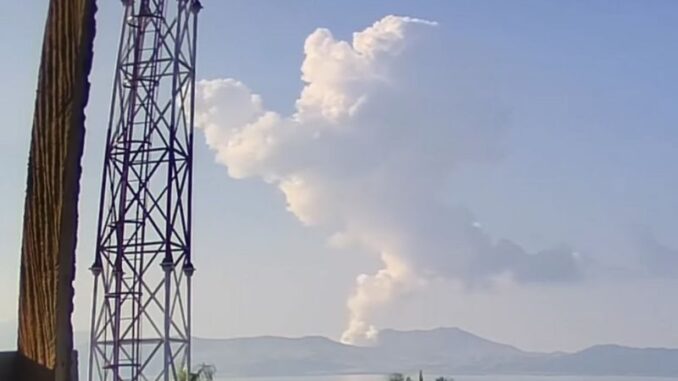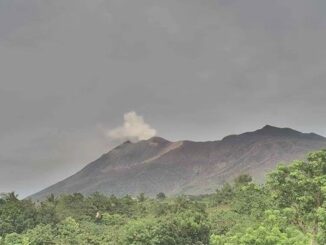
MANILA, Philippines — Taal Volcano erupted in a phreatic event early Thursday morning, October 10, according to the state seismology bureau, Phivolcs
The minor phreatic eruption, as captured by Phivolcs’ thermal and IP cameras at 7:21 a.m., produced a thick, white towering plume rising to 2,800 meters, billowing southwest.
A phreatic eruption primarily generates steam without expelling magma due to the interaction between groundwater and hot magma or volcanic rocks.
Despite recent signs of restlessness, the state seismology bureau continues to classify Taal Volcano as Alert Level 1, indicating low-level unrest.
LOOK: A minor phreatic eruption from Taal Volcano Island’s Main Crater at 07:21 AM today, 10 October 2024, was captured by thermal camera at the Daang Kastila Observation Station (VTDK) and by IP camera at the Taal Volcano Observatory (TVO) in Brgy. Buco, Talisay, Batangas. The… pic.twitter.com/mjBD4Dh8rI
— PHIVOLCS-DOST (@phivolcs_dost) October 10, 2024
Eruptions. In a Thursday advisory, Phivolcs reported a small phreatic eruption at Taal Volcano that lasted two minutes between 12 a.m. on October 9 and 12 a.m. on October 10.
Meanwhile, advisories from October 7 and 8 recorded a total of three phreatic eruption events.
No eruption occurred between 12 a.m. of October 8 to 12 a.m. of October 9, according to the Wednesday advisory.
This marks a decrease as per the advisory on Sunday, October 6, which reported six eruptions, including phreatic and phreatomagmatic events.
Since September 22, the total number of eruptions has increased to around 40, averaging about two to three eruptions per day. On October 5, Phivolcs had reported this figure as 30.
Volcanic tremors. The volcano’s activity also caused two volcanic tremors that lasted as long as two minutes.
While no eruption occurred at Taal on Tuesday, October 8, Phivolcs recorded two volcanic earthquakes.
Sulfur dioxide flux. Phivolcs reported on Thursday that Taal’s sulfur dioxide emissions rose to 2,256 tonnes per day on Wednesday, October 9, with plumes reaching heights of up to 3,000 meters directed towards the north-northwest and northeast.
In comparison, the last observation on October 7 logged the rate of emissions at 1,267 tons per day, with plumes rising only as high as 900 meters drifting west-northwest.
The state seismology bureau classified this as “voluminous emission,” unlike in its previous advisory on Monday, October 7, where it was only tagged as exhibiting “moderate emission.”
Earlier this week, Phivolcs stated that travel to Taal Volcano is still safe but recommended wearing face masks to avoid inhaling volcanic ash and gasses.





Be the first to comment